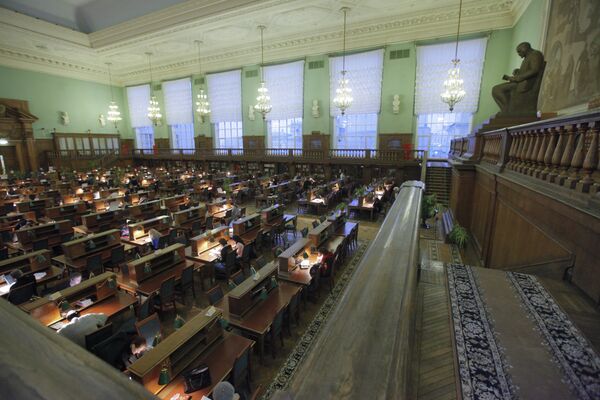MOSCOW, January 23 (RIA Novosti) – A United States-Russia row over religious texts intensified on Wednesday, when Moscow accused a Jewish group of a failure to return valuable books loaned to it over a decade ago.
A US court imposed a $50,000 a day fine on Russia last week for failing to comply with an earlier order to hand over religious texts from the Schneerson collection of sacred Jewish books to the Chabad-Lubavitch group, a Hasidic movement within Orthodox Judaism. The group is based in Brooklyn, New York.
But Russian Foreign Minister Sergei Lavrov hit back in kind on Wednesday and threatened legal action to return books he said Moscow had loaned the group. He also called the US court’s decision “outrageous” and said it had no basis in law.
“The Hasidics received some books from us from this library [Schneerson] for temporary use, for a couple of months, more than ten years ago, and have yet to return them,” Lavrov said. “This should also be the subject of court action.”
Russia’s Foreign Ministry said last week that the Schneerson collection is part of Russia's national heritage and the state property of the Russian Federation.
The Schneerson Library is a collection of books and religious documents assembled by the Chabad-Lubavitch Hasidic movement over two centuries prior to World War II in what is now Belarus.
Part of the collection, amassed by Lubavitcher Rebbe Yosef Yitzchok Schneerson, was nationalized by the Bolsheviks in 1918. Later, about 25,000 pages of manuscripts fell into the hands of the Nazis, and were later seized by the Red Army and handed over to the Russian State Military Archive. This part of Schneerson's Library is now kept in a central Moscow library.
The remaining part was taken out of the Soviet Union by Schneerson, who emigrated in the 1930s.
Since 1991, the year of Schneerson's death, leaders of the Brooklyn-based Orthodox Jewish movement have been trying to regain possession of the library, claiming it was illegally held by the Soviet authorities after the war.
In 1991, a Moscow court agreed to turn over the library to Chabad, but after the Soviet Union collapsed, the ruling was ignored. The Russian government now says it wants to keep the archive for future scholars.
In 2010, a court in Washington confirmed the American Jewish community’s right to the library, but Russia said the court’s decision was illegitimate. In late 2011, a US court ruled Russia must return about 12,000 books and 50,000 manuscripts from the library.
A lawyer for Chabad, Seth Gerber, said on Wednesday the group will "seek to enforce the sanctions order by all legal means," according to AP. Under that law, a sovereign nation is not immune to lawsuits in cases where property is taken in violation of international law.
"At the end of the day, all we want is our property back," said Rabbi Yosef Cunin of Chabad. "No amount of money can replace it. Our religious heritage is priceless."
The legal dispute over the Schneerson Library has caused Russian art institutions to cancel scheduled loans of world-renowned artworks to US art institutions for fear that they would be seized, even though Chabad has stated it will not go after any art deemed culturally significant by the State Department. Such art is protected from legal claims under the Immunity from Seizure Act.
Russian Culture Minister Vladimir Medinsky described the US court ruling as a “Russophobic show.”
“It was a strange Russophobic show grossly violating both US legislation, as admitted by the US administration, and all the norms of international law,” he told a news conference hosted by RIA Novosti last week.
“By the same logic, [Moscow’s] Khamovniki District Court could open hearings on the status of Alaska,” he said, adding that the claims by one of the US Hassidic communities to the Schneerson Library “are simply ridiculous.”


